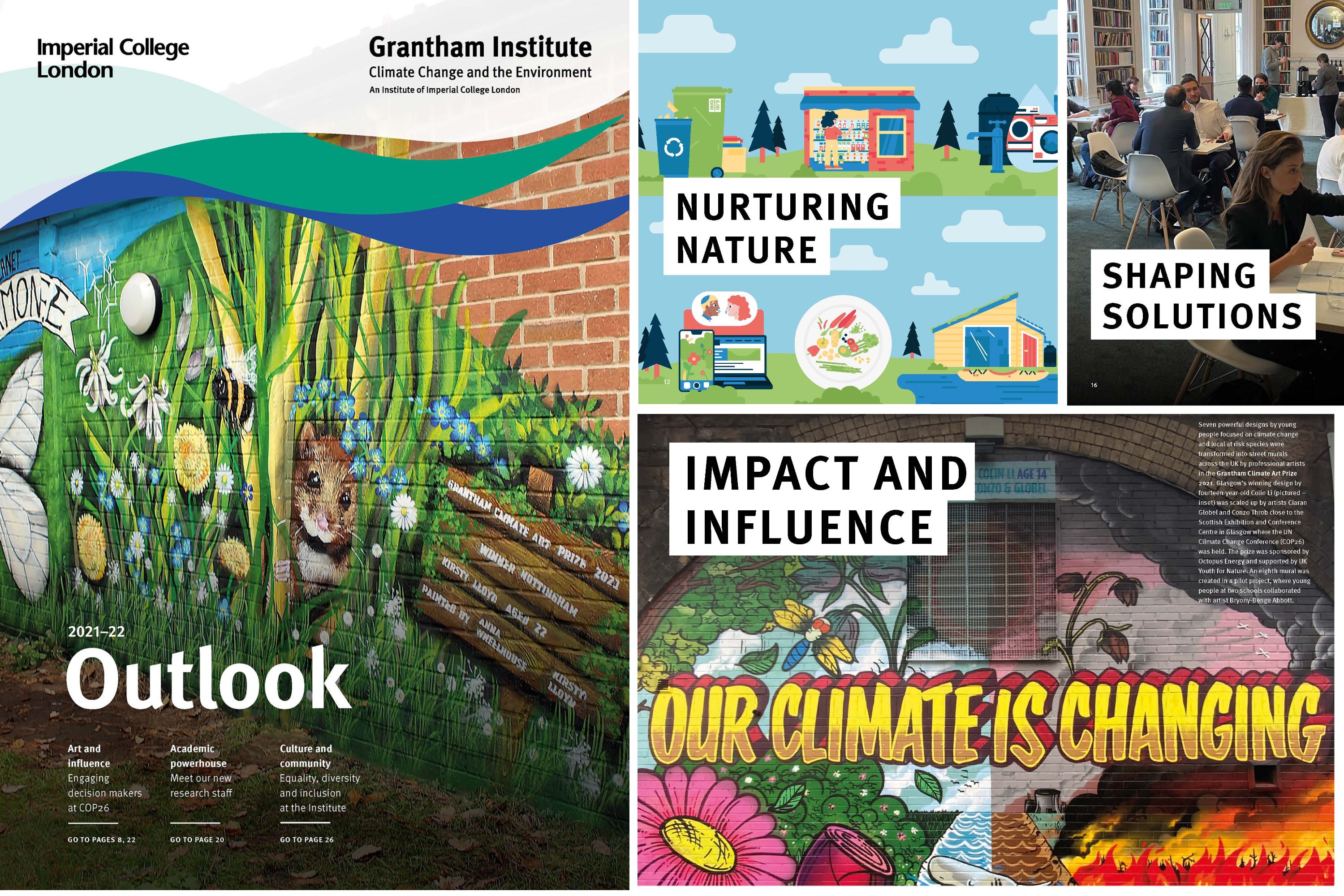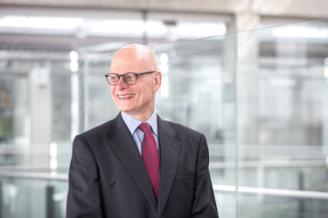Find out how our work is engaging policymakers, nurturing nature and shaping solutions to the climate crisis, and meet the new members of our academic powerhouse, in our annual magazine. View past editions here.
Grantham Institute Outlook 2021-2022
Read the magazine online below, or download the PDF here: Grantham Institute Outlook 2021-2022

Foreword and Intro
- Foreword - Professor Ian Walmsley
- Introduction - Professors Martin Siegert and Ralf Toumi, Co-Directors of the Institute
 During the past year we have seen even further evidence of our changing climate, with temperature records broken and extreme weather events globally. Clearly there is urgency for action.
During the past year we have seen even further evidence of our changing climate, with temperature records broken and extreme weather events globally. Clearly there is urgency for action.
The Grantham Institute has helped to put science at the heart of responses to climate change. It has been central to Imperial’s engagement with COP26 and spearheaded our partnership work with international universities. We will continue to help frame policy based on sound evidence. I am proud to see Imperial leading collaborative approaches across the research, innovation and higher education sector to deliver such action.
A Sustainable Society is one of the key themes through which our Academic Strategy aims to build on our strengths and accelerate discovery and impact. We continue to invest in enterprise activities, and the Centre for Climate Change Innovation is an important part of that ecosystem. We offer support along each stage of an entrepreneur’s journey – from advice to laboratory spaces – to help our staff and students take their climate change solutions to successful business at scale.
Imperial published its first Sustainability Strategy, which increased our ambition and sets out our long-term goal to be a net zero carbon institution by 2040. We also launched our Socially Responsible Investment Policy, where we pledged to divest from fossil fuel companies that are not actively moving towards meeting Paris Agreement targets, and use our research, education and convening power to influence companies to accelerate decarbonisation.
I am delighted to see the Institute’s ambitions to work collaboratively across the college – extending its work from where it began in Natural Sciences through to newly established collaborations with all our Faculties and I look forward to the Institute playing a leading role in the College’s response to climate change in the year ahead.
Professor Ian Walmsley FRS - Provost of Imperial College London
 While we longed for headlines other than COVID-19, nobody would have wished for the catastrophic environmental events we saw in 2021: more record-breaking heatwaves, wildfires, intense rainfall, flooding and storms. More favourable was the coverage of high-profile scientific reports, high-stakes negotiations and grass-roots campaigns in support of firm climate action. For the Grantham Institute, having the world’s attention on the climate crisis means seizing opportunities to advance our vision for a cleaner, greener, fairer future.
While we longed for headlines other than COVID-19, nobody would have wished for the catastrophic environmental events we saw in 2021: more record-breaking heatwaves, wildfires, intense rainfall, flooding and storms. More favourable was the coverage of high-profile scientific reports, high-stakes negotiations and grass-roots campaigns in support of firm climate action. For the Grantham Institute, having the world’s attention on the climate crisis means seizing opportunities to advance our vision for a cleaner, greener, fairer future.
As the pandemic continued, we looked to address the risks that the climate change and biodiversity crises already present. We initiated and led a virtual network of over 80 UK universities, engaging closely with the UK government as hosts and President of the UN Climate Change Conference (COP26), to help overcome the barriers to meaningful action.
With the Conference on home turf, we proudly promoted our staff and student delegates’ expertise in Glasgow, allowing their voices in the media and public discourse to reach a wide range of important audiences (see pages 22–25). While climate impacts in the UK and other rich countries often occupy our front pages, of great concern to us are prolonged and existential impacts in the Global South, such as water shortages in Africa and rising sea levels for Small Island Developing States who, as Rueanna Haynes stated in our Annual Lecture, do not have the finances to adapt (see page 5).
At the Institute, we have used this year to inspect the inclusivity of our activities and outlook, incorporating a new Equality, Diversity and Inclusion (EDI) strategy to inform our future work (see page 26). We are delighted to welcome leading academics Drs Ed Gryspeerdt, Fredi Otto and Caroline Wainwright, as well as researchers Drs Shivika Mittal and Mariam Zachariah, to the Institute. In this issue you can read more about their work on climate and clouds, attributing individual extreme weather events to climate change, India’s motivations to ‘phase down’ coal, and disrupted rainfall patterns in East Africa (see pages 9, 20–21).
Under increasing demand for climate-literate future leaders, we are expanding our training offerings: growing our award-winning MSc in Climate Change, Management and Finance to 120 students and introducing a new MSc in Climate Change, Innovation and Entrepreneurship to help creative engineers and scientists turn their ideas into businesses with purpose (see pages 24–25). Our new students will be taught at the Centre for Climate Change Innovation that we launched in March 2021 with the Royal Institution. You can read more about how new partnerships and progress at the Centre are adding to the breadth of our solutions-focused approach to climate change and the environmental crisis (see pages 16–19).
All our activities rely on the support of and collaboration with our stakeholders – we look forward to continuing to work with you all, to ensure the solutions to climate change remain a political, business and public focus.
We have so much still to do but by working together we can achieve so much.
- Martin Siegert FRSE, Professor of Geosciences and Co-Director of the Grantham Institute
- Ralf Toumi, Professor of Physics and Co-Director of the Grantham Institute
Contents:
Editor: Simon Levey, Communications Manager
Comments and feedback: grantham@imperial.ac.uk
Contributors: Hana Amer, Alyssa Gilbert, Neil Jennings, Nicole Kuchapski, Lottie Morgan, Katrine Petersen, Rosa Salazar Benazar, Siobhán Stack-Maddox,
Joanna Wilson
Cover photo: “We can bee in harmonee” – Grantham Climate Art Prize Winner (Nottingham) painted by Kirsty Lloyd and Anna Wheelhouse. Photo by Ryan Davis.
Copyright © 2021. The opinions expressed in Outlook are those of the contributors and not necessarily those of Imperial College London or the Grantham Institute.
Contact us
General enquiries: grantham@imperial.ac.uk
Media: grantham.media@imperial.ac.uk
Phone us on: +44 (0)20 7594 9666
Privacy Notice
View the Grantham Institute Privacy Notice.